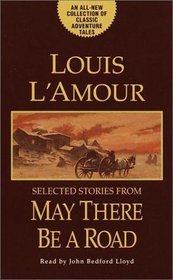I'm enough of a fan of the master of the western novel, Louis L'Amour, that I'll read (or listen to, in this case) anything he writes. In the great era of the pulps, he wrote lots and lots of good (and perhaps not quite so good) short fiction for the pulps. After he died and there were no more novels to publish, the estate scoured the files for anything left that could be published, and brought out numerous volumes of collected short work from the pulps.
This is one of them. The cassette tape version of May There Be a Road contains three stories: May There Be a Road, Making It the Hard Way, and The Hand of Kuan-yin. It's on two cassettes and runs about 2 1/2 hours.
The stories are good ones. I particularly enjoyed May There Be a Road. If you've seen the Indiana Jones movie that takes place in Tibet with the deep canyons crossed by shaky rope-and-plank bridges, you've got a nice visual picture of the setting of this story. It's exciting, it's interesting, and you learn a little bit of Tibetan/Red Chinese history in the process.
You'll like these stories. (By the way, the introductory material listed above by PBS describes the book. Not all the stories described there are on the cassette; just the three I mentioned.)
This is one of them. The cassette tape version of May There Be a Road contains three stories: May There Be a Road, Making It the Hard Way, and The Hand of Kuan-yin. It's on two cassettes and runs about 2 1/2 hours.
The stories are good ones. I particularly enjoyed May There Be a Road. If you've seen the Indiana Jones movie that takes place in Tibet with the deep canyons crossed by shaky rope-and-plank bridges, you've got a nice visual picture of the setting of this story. It's exciting, it's interesting, and you learn a little bit of Tibetan/Red Chinese history in the process.
You'll like these stories. (By the way, the introductory material listed above by PBS describes the book. Not all the stories described there are on the cassette; just the three I mentioned.)




